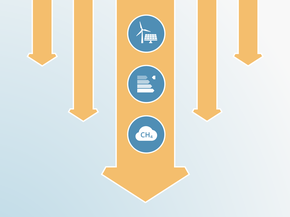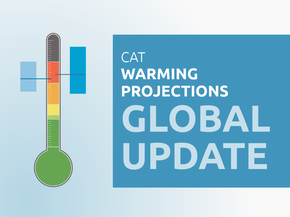Critically Insufficient4°C+
World
NDCs with this rating fall well outside of a country’s “fair share” range and are not at all consistent with holding warming to below 2°C let alone with the Paris Agreement’s stronger 1.5°C limit. If all government NDCs were in this range, warming would exceed 4°C.
Highly insufficient< 4°C
World
NDCs with this rating fall outside of a country’s “fair share” range and are not at all consistent with holding warming to below 2°C let alone with the Paris Agreement’s stronger 1.5°C limit. If all government NDCs were in this range, warming would reach between 3°C and 4°C.
Insufficient< 3°C
World
NDCs with this rating are in the least stringent part of a country’s “fair share” range and not consistent with holding warming below 2°C let alone with the Paris Agreement’s stronger 1.5°C limit. If all government NDCs were in this range, warming would reach over 2°C and up to 3°C.
2°C Compatible< 2°C
World
NDCs with this rating are consistent with the 2009 Copenhagen 2°C goal and therefore fall within a country’s “fair share” range, but are not fully consistent with the Paris Agreement long term temperature goal. If all government NDCs were in this range, warming could be held below, but not well below, 2°C and still be too high to be consistent with the Paris Agreement 1.5°C limit.
1.5°C Paris Agreement Compatible< 1.5°C
World
This rating indicates that a government’s NDCs in the most stringent part of its “fair share” range: it is consistent with the Paris Agreement’s 1.5°C limit.
Role model<< 1.5°C
World
This rating indicates that a government’s NDC is more ambitious than what is considered a “fair” contribution: it is more than consistent with the Paris Agreement’s 1.5°C limit.
Sources
List of references
- AMP. (, March). India Poised to Ease EV Target. Advanced Mobility Project. Retrieved from https://www.advancedmobilityproject.com/blog/post/india-poised-to-ease-ev-target
- Andrew, R. (2018). Why India’s CO2 emissions grew strongly in 2017. Retrieved from https://www.carbonbrief.org/guest-post-why-indias-co2-emissions-grew-strongly-in-2017
- BEE. (2018). PAT scheme (Perform, Achieve and Trade scheme). Retrieved from https://www.youtube.com/watch?v=ye4RpHAqwDk
- Bloomberg. (2018, September 7). India proposes a goal of 15% electric vehicles in five years. The Economic Times India. Retrieved from https://economictimes.indiatimes.com/industry/auto/auto-news/india-proposes-a-goal-of-15-electric-vehicles-in-five-years/articleshow/65715165.cms
- BRIDGE TO INDIA. (2018). INDIA RE CEO SURVEY 2018. Retrieved from http://www.bridgetoindia.com/reports/india-re-ceo-survey-may-2018/
- Business Today. (2019). Govt notifies FAME-II scheme with Rs 10,000-crore outlay to encourage adoption of electric vehicles. Retrieved May 22, 2019, from https://www.businesstoday.in/current/economy-politics/govt-notifies-fame-ii-scheme-with-rs-10000-crore-outlay-to-encourage-adoption-of-electric-vehicles/story/326068.html
- CEA. (2018). National Electricity Plan.
- Central Electricity Authority. (2016). Draft Electricity Plan(Vol. 1). Retrieved from http://www.cea.nic.in/reports/committee/nep/nep_dec.pdf
- Chatterjee, A. (2018, August 7). Transmission woes: SECI halves wind capacity for auction. Financial Express. Retrieved from https://www.financialexpress.com/industry/transmission-woes-seci-halves-wind-capacity-for-auction/1271885/
- Coal India. (2018). Coal Vision 2030: Stakeholders’ Consultation. Retrieved from https://www.coalindia.in/DesktopModules/DocumentList/documents/Coal_Vision_2030_document_for_Coal_Sector_Stakeholders_Consultation_27012018.pdf
- Darby, M. (2018). India’s power minister says the country can smash its 2022 renewable power goal. Will it happen? Retrieved May 24, 2019, from https://www.climatechangenews.com/2018/06/13/india-says-will-smash-2022-renewable-power-goal-will-happen/
- Dubash, N. K., Kale, S., & Bharvirkar, R. (Eds.). (2018). Mapping Power: The Political Economy of Electricity in India’s States. Oxford University Press.
- Economic Times India. (2018, May 14). Government announces national wind-solar hybrid policy. The Economic Times India. Retrieved from https://economictimes.indiatimes.com/news/economy/policy/government-announces-national-wind-solar-hybrid-policy/articleshow/64163756.cms
- EDF, CDC Climat Research, & IETA. (2015). India: An Emissions Trading Case Study. Retrieved from https://ieta.memberclicks.net/assets/CaseStudy2015/india_case_study_may2015.pdf
- Ghosh, M. (2018, June 27). Govt officials refuse to use electric cars made by Mahindra, Tata Motors. Livemint.Com. Retrieved from https://www.livemint.com/Auto/7OOIIWPCGG4nnVmv1VyWVP/Govt-officials-refuse-to-use-electric-cars-made-by-Mahindra.html
- Gordon-Harper, G. (2018). Clean Energy Powers Sustainable Cities as Fossil Fuel Companies Predict Further Growth in Renewables. Retrieved from http://sdg.iisd.org/news/clean-energy-powers-sustainable-cities-as-fossil-fuel-companies-predict-further-growth-in-renewables/
- Government of India. (2012). India Second National Communication to the United Nations Framework Convention on Climate Change. Retrieved from http://unfccc.int/resource/docs/natc/indnc2.pdf
- Government of India. (2013). Twelfth Five Year Plan (2012–2017) Faster, More Inclusive and Sustainable Growth(Vol. I). Retrieved from http://planningcommission.nic.in/plans/planrel/fiveyr/12th/pdf/12fyp_vol1.pdf
- Government of India. (2015a). First Biennial Update Report to the United Nations Framework Convention on Climate Change. Ministry of Environment, Forest and Climate Change, Government of India. Retrieved from http://unfccc.int/resource/docs/natc/indbur1.pdf
- Government of India. (2015b). INDIA’S INTENDED NATIONALLY DETERMINED CONTRIBUTION :WORKING TOWARDS CLIMATE JUSTICE. Retrieved from http://www4.unfccc.int/submissions/INDC/Published Documents/India/1/INDIA INDC TO UNFCCC.pdf
- Government of India. (2016). Presentation on Perform , Achieve and Trade ( PAT ) Scheme. Retrieved from https://www.iea.org/media/training/eetw2016/industry/Mr.HanumantharayappaPresentationonPerformAchieveandTradePATScheme.pdf
- Government of India. (2018a). Draft National Forest Policy, 2018. Retrieved from http://www.indiaenvironmentportal.org.in/files/file/Draft%20National%20Forest%20Policy,%202018.pdf
- Government of India. (2018b). India: Second Biennial Update Report to the United Nations Framework Convention on Climate Change. Retrieved from https://unfccc.int/sites/default/files/resource/INDIA%20SECOND%20BUR%20High%20Res.pdf
- Government of India. (2019). KUSUM Scheme. Retrieved May 22, 2019, from http://pib.nic.in/newsite/PrintRelease.aspx?relid=188499
- IEA. (2017a). Energy Access Outlook 2017. Paris. Retrieved from https://www.iea.org/publications/freepublications/publication/WEO2017SpecialReport_EnergyAccessOutlook.pdf
- IEA. (2017b). World Energy Outlook 2017. Paris, France: International Energy Agency. Retrieved from https://www.iea.org/weo2017/
- IEA. (2017c). World Energy Statistics and Balances. 2017 Edition. Paris, France, France: International Energy Agency.
- IEA. (2018a). Technology Roadmap - Low-Carbon Transition in the Cement Industry. Retrieved from https://webstore.iea.org/technology-roadmap-low-carbon-transition-in-the-cement-industry
- IEA. (2018b). World Energy Outlook 2018. Paris. Retrieved from https://www.iea.org/weo2018/
- IEA. (2019). CO2 Emissions Statistics. Retrieved May 20, 2019, from https://www.iea.org/statistics/co2emissions/
- IEEFA. (2015). India’s Electricity-Sector Transformation. Retrieved from http://ieefa.org/wp-content/uploads/2015/08/IEEFA-Indian-Electricity-Sector-Transformation-11-August-2015.pdf
- IISD. (2018a). India’s Energy Transition: Subsidies for Fossil Fuels and Renewable Energy, 2018 Update. Retrieved from https://www.istockphoto.com/ch/en/
- IISD. (2018b). The Evolution of the Clean Energy Cess on Coal Production in India. Retrieved from https://www.iisd.org/sites/default/files/publications/stories-g20-india-en.pdf
- IRENA. (2019). Renewable capacity statistics 2019. https://doi.org/10.1016/S2255-4971(15)30126-9
- Laan, T., Viswanathan, B., Beaton, C., Shardul, M., & Gill, B. (2019). Policy Approaches for a Kerosene to Solar Subsidy Swap in India. Retrieved from www.iisd.org/gsi
- Mallapur, C. (2018, May 9). At a mere six hours a day, Karnataka’s agriculture sector receives least power in the country, reveals government data. Firstpost. Retrieved from https://www.firstpost.com/india/at-a-mere-six-hours-a-day-karnatakas-agriculture-sector-receives-least-power-in-the-country-reveals-government-data-4462365.html
- McKenna, P. (2019). India Is Now Investing More in Solar than Coal, but Will Its Energy Shift Continue? | InsideClimate News. Retrieved May 24, 2019, from https://insideclimatenews.org/news/20052019/india-solar-investment-coal-modi-election-renewable-energy-future
- MNRE. (2010). Jawaharlal Nehru National Solar Mission.
- MNRE. (2015). New Solar Energy Policy. Retrieved September 1, 2015, from http://pib.nic.in/newsite/pmreleases.aspx?mincode=28
- NABARD. (2019). Other Climate Change Initiatives of NABARD. Retrieved from https://www.nabard.org/content1.aspx?id=587&catid=8&mid=489
- NITI Aayog. (2017a). Draft National Energy Policy.
- NITI Aayog. (2017b). India Three Year Aciton Agenda.
- Rastogi, N. P. (2019). Gearing Up for Change: Challenges faced by Indian Private Sector as they take on Carbon Pricing — Carbon Pricing Leadership. Retrieved May 22, 2019, from https://www.carbonpricingleadership.org/blogs/2019/3/14/gearing-up-for-change-challenges-faced-by-indian-private-sector-as-they-take-on-carbon-pricing
- Rattani, V., Venkatesh, S., Pandey, K., Jitendra, Kukreti, I., Somvanshi, A., & Sangomla, A. (2018). India’s National Action Plan on Climate Change needs desperate repair. Retrieved from https://www.downtoearth.org.in/news/climate-change/india-s-national-action-plan-on-climate-change-needs-desperate-repair-61884
- Reklev, S. (2018, November 7). India pegs Mar. 2019 as potential start date for pilot carbon market mechanism. Carbon Pulse. Retrieved from http://carbon-pulse.com/62710/
- Reuters. (2018, March 10). Ola flunks electric vehicle fleet test on Nagpur roads. The Hindu. Retrieved from https://www.thehindu.com/business/Industry/ola-flunks-electric-vehicle-fleet-test-on-nagpur-roads/article23035190.ece
- Roy, S. (2018, July 17). Tata Nano – Why Did the People Not Want the People’s Car? The Wire. Retrieved from https://thewire.in/business/tata-nano-why-did-the-people-not-want-the-peoples-car
- Sagebiel, J., Kimmich, C., Müller, M., Hanisch, M., & Gilani, V. (2015). Background of the Agricultural Power Supply Situation in India and Andhra Pradesh. In Enhancing Energy Efficiency in Irrigation. Springer.
- Saluja, N., & Singh, S. (2018, June 5). Renewable energy target now 227 GW, will need $50 billion more in investments. The Economic Times India. Retrieved from https://economictimes.indiatimes.com/industry/energy/power/india-will-add-225-gw-renewable-energy-project-capacity-by-2022-r-k-singh/articleshow/64461995.cms
- Scroll.in. (2017). Climate change: India begins work on meeting its obligations under the Paris Agreement. Retrieved September 4, 2017, from https://scroll.in/article/843416/climate-change-india-begins-work-on-meeting-its-obligations-under-the-paris-agreement
- Shah, R. (2018, March 8). Government finally wakes up: Sets a realistic goal of 30% electric vehicles by 2030 from existing 100% target. Financial Express. Retrieved from https://www.financialexpress.com/auto/car-news/government-finally-wakes-up-sets-a-realistic-goal-of-30-electric-vehicles-by-2030-from-existing-100-target/1091075/
- Sharma, K. (2018, March 8). India scaling back electric vehicle ambitions. Nikkei Asian Review. Retrieved from https://asia.nikkei.com/Economy/India-starts-argument-over-realistic-EV-targets-for-2030
- Shearer, C., Fofrich, R., & Davis, S. J. (2017). Future CO2 emissions and electricity generation from proposed coal-fired power plants in India. Earth’s Future, 5(4), 408–416. https://doi.org/10.1002/2017EF000542
- TFE Consulting. (2018). The Case for Electric Mobility in India. Munich. Retrieved from https://www.tfeconsulting.com/_website/wp-content/uploads/2018/05/TFE_Report-India-electric-mobility.pdf
- Thakker, A. (2018, June 22). India’s States Promote Electric Vehicles While the Central Government Equivocates. The Diplomat. Retrieved from https://thediplomat.com/2018/06/indias-states-promote-electric-vehicles-while-the-central-government-equivocates/
- The Economist. (2018, August). India shows how hard it is to move beyond fossil fuels. The Economist. Retrieved from https://www.economist.com/briefing/2018/08/02/india-shows-how-hard-it-is-to-move-beyond-fossil-fuels
- The International Council on Clean Transportation. (2014). FACT SHEET INDIA: LIGHT-DUTY VEHICLE EFFICIENCY STANDARDS. Retrieved from http://www.theicct.org/sites/default/files/info-tools/pvstds/India_PVstds-facts_dec2014.pdf
- Tongia, R., Harish, S., & Walawalkar, R. (2018). Integrating Renewable Energy Into India’s Grid: Harder Than It Looks. Retrieved from https://www.brookings.edu/wp-content/uploads/2018/11/Complexities-of-Integrating-RE-into-Indias-grid.pdf
- Transportpolicy.net. (2017). India: Light-duty: Fuel Consumption.
- UNFCCC. (2016). GHG Profiles - Non-Annex I. Retrieved September 4, 2017, from http://di.unfccc.int/ghg_profile_non_annex1
- Upadhyay, A. (2018, July 6). India Sees Slower Shift to EVs in Blow to Green Vehicles Goal. Bloomberg . Retrieved from https://www.bloomberg.com/news/articles/2018-07-06/india-sees-slower-shift-to-evs-in-blow-to-green-vehicles-goal
- US EPA. (2012). Global Anthropogenic Non-CO2 Greenhouse Gas Emissions: 1990 - 2030. Retrieved from http://www.epa.gov/climatechange/Downloads/EPAactivities/EPA_Global_NonCO2_Projections_Dec2012.pdf
- World Bank. (2017). CO2 emissions (metric tons per capita). Retrieved from https://data.worldbank.org/indicator/EN.ATM.CO2E.PC
- Worrall, L., Roberts, L., Viswanathan, B., & Beaton, C. (2019). India’s Energy Transition: Stranded coal power assets, workers and energy subsidies. Retrieved from www.iisd.org/gsi
Further analysis
Latest publications
Stay informed
Subscribe to our newsletter




